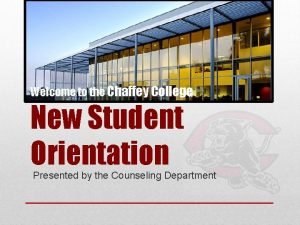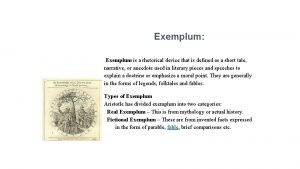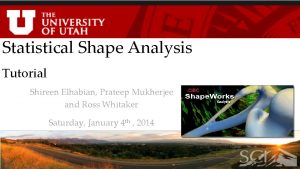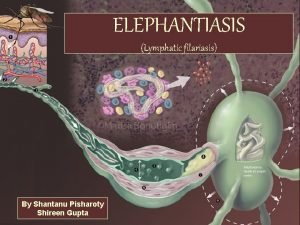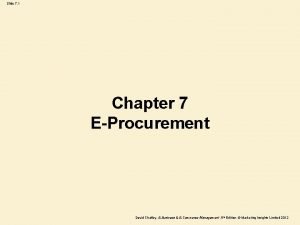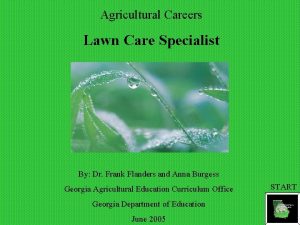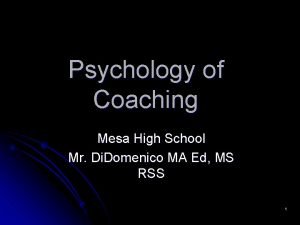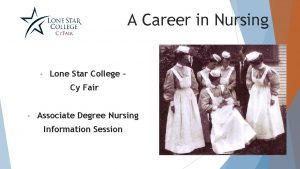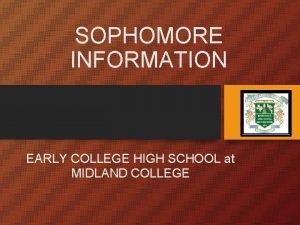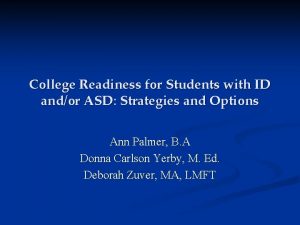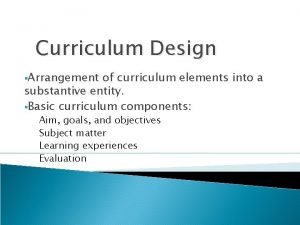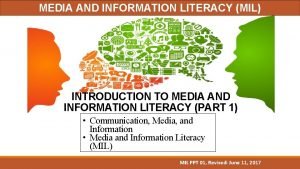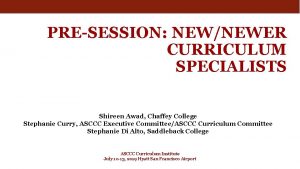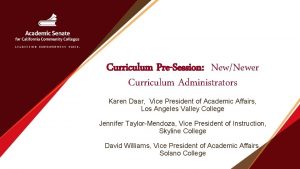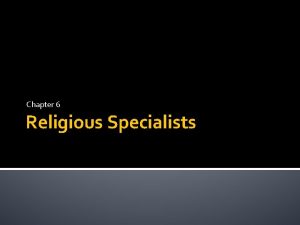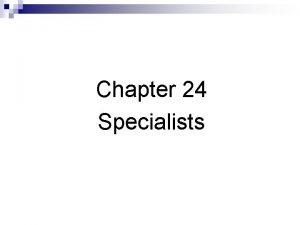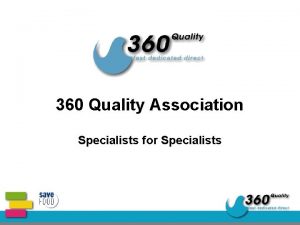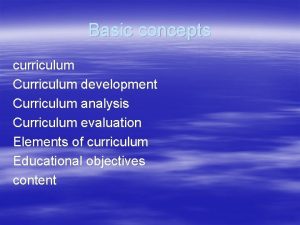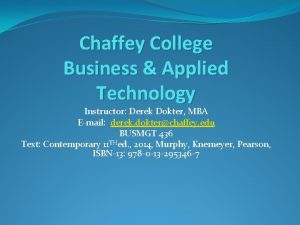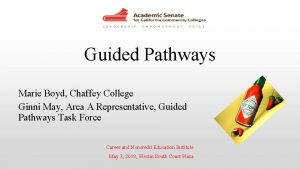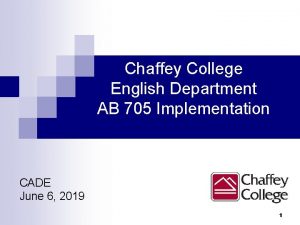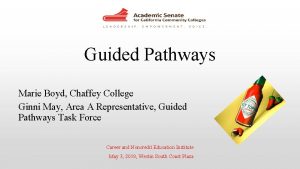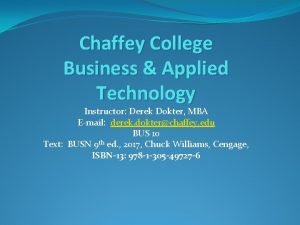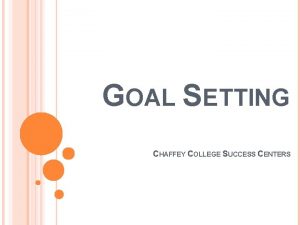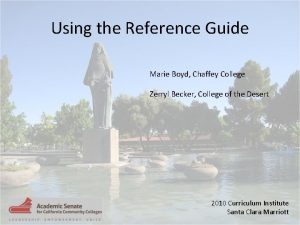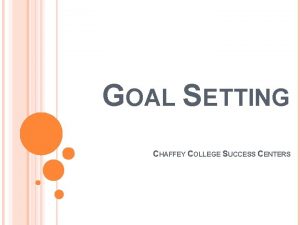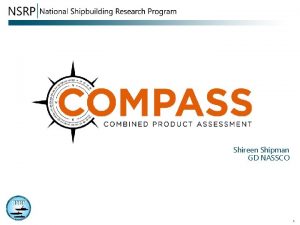PRESESSION NEWNEWER CURRICULUM SPECIALISTS Shireen Awad Chaffey College


























- Slides: 26

PRE-SESSION: NEW/NEWER CURRICULUM SPECIALISTS Shireen Awad, Chaffey College Stephanie Di Alto, Saddleback College Nili Kirschner, Woodland College, ASCCC Curriculum Committee ASCCC Curriculum Institute July 7 -10, 2020 – Virtual Conference

Overview • Curriculum Specialists’ Roles • Curriculum Specialists and Codes • Course Basic (CB) Data Elements • Curriculum Inventory (COCI) and Management Information System (MIS) Data Base • Non-CB Codes to Familiarize Yourself With • What to Know Before Changing Codes • Keeping on Top of Curriculum Developments • Resources • Related Breakout Sessions 2

Curriculum Specialists’ Common Job Duties USUALLY, under the general supervision of the Vice President for Instruction, Curriculum Specialists: • Coordinate the curriculum approval process from the course and program proposal level through local and state approval, including ACCJC if appropriate • Assure that new and revised curriculum is documented and approved by the district and chaptered with the CCCCO in a timely manner prior to offering • Coordinate with the CCCCO in assuring compliance for program and course approval • Attend curriculum Technical Review Committee meetings to provide technical and resource support 3

Common Job Duties, continued • Work with faculty to clarify comments and resolve issues prior to COCI submissions (Tech Review meetings) • Participate in college Curriculum Committee meetings and record proceedings • Prepare and maintain documentation related to curriculum approval (the official “owners”) • Coordinate, edit, and produce content for the College Catalog, Catalog Addenda, and Schedule of Classes • Track completion of changes for publication • Coordinate with the Financial Aid office to update the ECAR/PPA 4

Specialists Sometimes… • Assure compliance of the curriculum with Student Services in the area of Articulation, Matriculation, and Admissions and Records • Perform a variety of technical duties relative to assigned area 5

Tasks of Others Faculty or administrative responsibilities include: ● Creating the Course and Program Outlines of Record ● Determining Course Design (lecture/lab/studio) ● Determining the course units ● Determining the Minimum Qualifications for a course ● Assigning TOP, SAM, and other coding* * These elements should be established through collegial consultation with faculty and administration. 6

What is Not Part of the Specialist’s Role • Writing/revising curriculum for the faculty • The 10 + 1 (Title 5, § 53200) gives faculty primary authority over and responsibility for curriculum • Approving curriculum • This is the purview of faculty and administrators • Submitting to ASSIST or C-ID • This is the role of the articulation officer 7

Partnership with Curriculum Chair • Build a partnership with the Curriculum Chair as these roles support each other • Formulate a clear understanding of respective roles • Develop and maintain open communication • Collaborate together with the CIO to develop annual curriculum timelines, calendars, goals and objectives • Attend training opportunities together 8

Breakout Session You will be placed into smaller groups in order to discuss: What aspect(s) of curriculum do you feel least confident in your knowledge about? While we may not have enough time to report back, use these 10 minutes to share and help one another. 9

Curriculum Specialists and Codes Typical roles may include: • Serving as a resource and providing technical guidance when needed to the curriculum chair, faculty, staff, and administrators • Develop a thorough understanding of code definitions and rules, relationships amongst and/or between codes, and the implications of changing codes • Reviewing faculty applied codes during the technical review process for new and revised curriculum to confirm they meet coding rules • Entering codes for programs and courses in the Chancellor’s Office Curriculum Inventory (COCI) • Validating that codes are aligned/consistent across various curriculum systems – local curriculum management system, scheduling system, COCI, etc. • Assisting the district in reconciling any course-level referential or syntactical MIS errors for the college during end-of-term reporting 10

Curriculum Specialists and Codes, cont. As a new Curriculum Specialist you can prepare by familiarizing yourself with the following resources: • The CB (Course Basic) Codes in the Data Element Dictionary (DED) • Refer back often to confirm whether coding decisions will pass validation rules as local and state systems don’t always cross-validate or catch errors • The Taxonomy of Programs (TOP) • Coding crosswalks – TOP/CIP/SOC • Appendix B 2 in the CCC Taxonomy of Programs Manual • 2020 TOP-CIP Crosswalk prepared by West. Ed & reviewed by Centers of Excellence • O*Net CIP/SOC Crosswalk • Title 5 requirements for courses and programs • CCCCO MIS Data Mart – college master course file, program course file 11

Course Basic (CB) Data Elements • What are they? • Codes assigned to each course for tracking, reporting, and apportionment • All courses have these codes, but specific to that course • For example, every course will have CB 02 (Title), but not all courses will have the same title • Who assigns them? • Faculty assign the codes to their courses • Curriculum Specialists may provide guidance when necessary • These data elements can be programmed in your curriculum management system to be completed by faculty during curriculum development or modification • Suggestion: Review codes during Tech Review to offer a second check or assistance • When are they assigned? • Step 1: During development of courses (faculty) • Step 2: In COCI (Curriculum Specialist) • Step 3: In local SIS system (Specialist/other assigned position) 12

CB Data Elements, cont. • Keep in mind some CB codes must be validated against other codes. The CB Data Element Dictionary (DED) provides guidance on each of these validations • In the event that the codes do not align as described in the DED, COCI will produce a validation error after submission attempt 13

Chancellor’s Office Curriculum Inventory (COCI) and Management Information System (MIS) Database The CB codes are initially recorded in colleges’ local curriculum management systems and subsequently entered by Curriculum Specialists in the Chancellor’s Office Curriculum Inventory (COCI) – one active record should exist for each course listed in the college catalog or addenda The data that is entered into COCI feeds into the Management Information System ( MIS) Database: • Districts submit a file to MIS for each college within the district approximately one month following the end of each term to report on courses offered and CB data checks are performed by MIS: • Referential Check - compares data reported by districts to the master course file in Data Mart (which receives information from COCI) and identifies discrepancies • Syntactical Check – validates that codes applied to courses comply with rules in Data Element Dictionary & identifies data elements that violate technical specifications/coding rules 14

MIS Data Mart • The Management Information System (MIS) Database collects data from a variety of sources and serves to provide information about students, courses, student services, outcomes, and faculty and staff. • For Curriculum Specialists the 3 most important reports in the Data Mart are: • The Master Course file – identifies select CB data elements associated with all of a college’s courses (active and inactive) • The Program file – identifies select program data elements associated with all of a college’s programs (active and inactive) • The Program Course file – identifies via program control number and course control number the courses that are included within programs 15

Non-CB Codes to Familiarize Yourself With Classification of Instructional Programs (CIP) Codes • Six digit codes used to organize, collect, and report fields of study and program completions • More than one CIP code can align to a TOP code • Not all CIP codes are applicable for community colleges • Uses include: • Eligibility for financial aid and veterans benefits • Gainful employment and accreditation reporting of CTE outcomes • Federal reporting (IPEDS) • Accreditation – to determine enrollment and completion rates • Baccalaureate degrees • Program awards in COCI 16

Non-CB Codes, cont. Standard Occupational Classification (SOC) Codes • Six digit codes used to classify workers into occupational categories • Occupations classified based on work performed and, in some cases, on the skills, education and/or training needed to perform the work • Uses include: • Calculating supply and demand, developing labor market projections for job openings • Tracking program completers regarding whether they go on to a federally recognized occupation • TOP Code Alignment Project • Gainful Employment • Salary Surfer • Workforce Innovation and Opportunity Act (WIOA) 17

What to Know Before Changing Codes Before changing codes understand how the changes will affect college processes including: • Federal reports – Gainful employment, accreditation, and IPEDS • State reports – MIS reporting (term and annual data collection) • Accreditation – Accrediting Commission for Community and Junior Colleges (ACCJC) • ACCJC uses CIP codes to determine the content of programs • Funding – Strong Workforce, Perkins • Codes impact the tools that provide supply and demand data • Selecting a non-vocational TOP/SAM code can result in decreased funding • Coding a course as introductory excludes it from some metrics associated with Perkins and Strong Workforce funding 18

What to Know Before Changing Codes, cont. College processes affected also include: • Students – Financial aid and veterans programs • Erroneous codes can jeopardize federal financial aid and veterans benefits because it may appear students are enrolled in programs that don’t exist • College Planning – Facilities and program review; accreditation • Changes to TOP codes for courses and/or programs may affect program review and hiring priorities • Changes to TOP codes at the 2 -digit or 4 -digit level on courses and/or programs can affect space need calculations in the Facilities Utilization, Space Inventory Options Net (FUSION) planning system used for funding, managing, and completing facility projects • If codes are wrong, programs won’t show in tools like the Launch. Board and metrics won’t be correct 19

When is it appropriate to change a code? • To correct coding errors • To reflect changes consciously made through the curriculum process intended to apply a more accurate code • In response to changes made to coding taxonomies (CIP and SOC codes are updated every 10 years) 20

Let us Know! • What questions do you have for us? • Is there anything you would like to share? 21

Keeping on Top of Curriculum Developments • Academic Senate for California Community Colleges Papers: https: //www. asccc. org/publications/academic-senate-papers • Academic Senate for California Community Colleges Rostrum: https: //www. asccc. org/publications/rostrum • California Community Colleges Board of Governors: https: //www. cccco. edu/About-Us/Board-of-Governors/Meeting-schedule-minutes-and-agenda • California Community Colleges Curriculum Committee (5 C): https: //www. cccco. edu/About-Us/Chancellors-Office/Divisions/Educational-Services-and-Support/What-wedo/Curriculum-and-Instruction-Unit/California-Community-College-Curriculum-Committee • Chancellor’s Office Curriculum Assistance Listserv: http: //listserv. cccnext. net/scripts/wa. exe? SUBED 1=CURRICASSIST • Curriculum Institute and Regional Meetings: Search “Events” on https: //www. asccc. org • Yahoo Curriculum Specialists Listserv: Email cacurricstaff-subscribe@yahoogroups. com 22

Resources • CCCCO MIS Data Mart: https: //datamart. cccco. edu/datamart. aspx • Course Data Elements: https: //webdata. cccco. edu/ded/cb/cb. htm • Credit Course Repetition Guidelines: https: //www. cccco. edu/-/media/CCCCO-Website/About-Us/Divisions/Educational-Services-and-Support/Academic-Affairs/What-we-do/Curriculum-and-Instruction. Unit/Files/Credit. Course. Repetition. Guidelines. Final_pdf. ashx? la=en&hash=8 E 483 A 6595412289711 EB 8 B 42 D 1 A 64 DD 37 B 91 C 75 • Guidelines for Community Services Offering: https: //www. cccco. edu/-/media/CCCCO-Website/About-Us/Divisions/Educational-Services-and-Support/Academic-Affairs/What-we-do/Curriculum-and-Instruction. Unit/Files/Community. Svcs. Offering. Guidelines. Final 102412 pdf. ashx? la=en&hash=4 DB 600 E 58 B 9063170 CF 75049 FAE 75 A 731 A 50 DC 3 F https: //www. cccco. edu/-/media/CCCCO-Website/About-Us/Divisions/Educational-Services-and-Support/Academic-Affairs/What-we-do/Curriculum-and-Instruction. Unit/Files/Community. Svcs. Offerings. FAQs 111312 pdf. ashx? la=en&hash=4 C 4325 BB 5 ECE 512 EAB 518 B 67 A 3 CE 7597 E 8 D 4 BF 5 D • Guidelines for Required Instructional Materials in the California Community Colleges: https: //www. cccco. edu/-/media/CCCCO-Website/About-Us/Divisions/Educational-Services-and-Support/Academic-Affairs/What-we-do/Curriculum-and. Instruction-Unit/Files/Instructional. Materials. Guidelines 12813 pdf. ashx? la=en&hash=43 A 5623 A 5 B 4 DEF 466 E 41707 B 153 ED 8 F 4 B 7 D 5 FA 8 C • Noncredit at a Glance: https: //www. cccco. edu/-/media/CCCCO-Website/About-Us/Divisions/Educational-Services-and-Support/Academic-Affairs/What-we-do/Curriculum-and-Instruction. Unit/Files/Noncredit. AGlance_5 e_pdf. ashx? la=en&hash=11028 EC 542 EE 7088 CF 35347228 A 4543835 DDDAE 2 23

Resources, cont. • Policies for Prerequisites, Corequisites and Advisories on Recommended Preparation: https: //www. cccco. edu/-/media/CCCCO-Website/About-Us/Divisions/Educational-Services-and-Support/Academic-Affairs/What-we-do/Curriculum-and. Instruction-Unit/Files/Prerequisites_Guidelines_55003 -Final_pdf. ashx? la=en&hash=9762 BC 2690 CD 4 F 9 E 7 E 99037 AF 78941682 D 006 D 3 D • Program and Course Approval Handbook (7 th Edition): https: //www. cccco. edu/-/media/CCCCO-Website/Reports/CCCCO_Report_Program_Course_Approval-web 102819. pdf? la=en&hash=06918 DD 585 E 9 F 8 C 0805334 FEA 3 EB 1 E 6872 C 22 F 16 • Taxonomy of Programs (6 th Edition): https: //www. cccco. edu/-/media/CCCCO-Website/About-Us/Divisions/Educational-Services-and-Support/Academic-Affairs/What-we-do/Curriculum-and. Instruction-Unit/Files/TOPmanual 6200909 corrected 12513 pdf. ashx? la=en&hash=C 43 FF 81459 CBF 3 BFF 7 D 8 FC 14 EFEC 28 A 2 E 6 D 01244 • The Course Outline of Record: A Curriculum Reference Guide Revisited: https: //www. asccc. org/sites/default/files/COR. pdf • Supplemental Learning Assistance and Tutoring Regulations and Guidelines: https: //www. cccco. edu/-/media/CCCCO-Website/About-Us/Divisions/Educational-Services-and-Support/Academic-Affairs/What-we-do/Curriculum-and. Instruction. Unit/Files/supplemental_learning_and_supervised_tutoring_regs_guidelines_pdf. ashx? la=en&hash=BE 79 EC 587 F 01 C 133 AA 704 F 3 ED 2730 B 303 CB 93 AAA 24

Related Breakout Suggestions Tuesday, July 7 • 1: 00 – 2: 00: Networking and Collaboration by Role – Curriculum Specialists and Classified Professionals • 2: 45 – 4: 00: All About the Credit Hour – An Introduction Wednesday, July 8 • 10: 45 – 12: 00: Course Outline of Record – The Basics • 1: 00 – 2: 15: Catalogs, Brown Act, Curriculum, Accreditation, and Public Documents • 2: 45 – 4: 00: Noncredit Basics Thursday, July 9 • 9: 00 – 10: 15: Local Curriculum Processes - Closing the Loop on Curriculum Changes • 1: 00 – 2: 15: Program Submission Requirements • 2: 45 – 4: 00: The Course is Approved. What Happens Next? Friday, July 10 • 2: 45 – 4: 00: Developing and Maintaining Partnerships between Classified Professionals, Administrators, and Faculty Curriculum Leaders 25

Contacts • Shireen Awad: sharon. awad@chaffey. edu • Stephanie Di Alto: sdialto@saddleback. edu • Nili Kirschner: nkirschn@yccd. edu 26
 Laura hope chaffey college
Laura hope chaffey college Nearpod jin
Nearpod jin My chaffeyview
My chaffeyview Dr khaled awad
Dr khaled awad Exemplum literary definition
Exemplum literary definition Awad mataria
Awad mataria Shape works
Shape works Shireen malekafzali
Shireen malekafzali Shireen gupta
Shireen gupta Aiming for digital marketing excellence
Aiming for digital marketing excellence David chaffey
David chaffey Swarovski swot
Swarovski swot What education do lawn care specialists have
What education do lawn care specialists have Iprs limited
Iprs limited Bariatric specialists of north carolina
Bariatric specialists of north carolina Ges - global experience specialists
Ges - global experience specialists Systems integration specialists
Systems integration specialists Variety and assortment
Variety and assortment Concrete hydrodemolition specialists
Concrete hydrodemolition specialists Psyc 1504 learning journal unit 1
Psyc 1504 learning journal unit 1 Lonestar nursing application
Lonestar nursing application Lonestar nursing requirements
Lonestar nursing requirements Early college high school at midland college
Early college high school at midland college Wake tech admissions
Wake tech admissions Arrangement of element of curriculum
Arrangement of element of curriculum Introduction to mil
Introduction to mil Trojan snow
Trojan snow


